关于端午节英语故事阅读英文版欣赏
- 格式:doc
- 大小:25.00 KB
- 文档页数:9
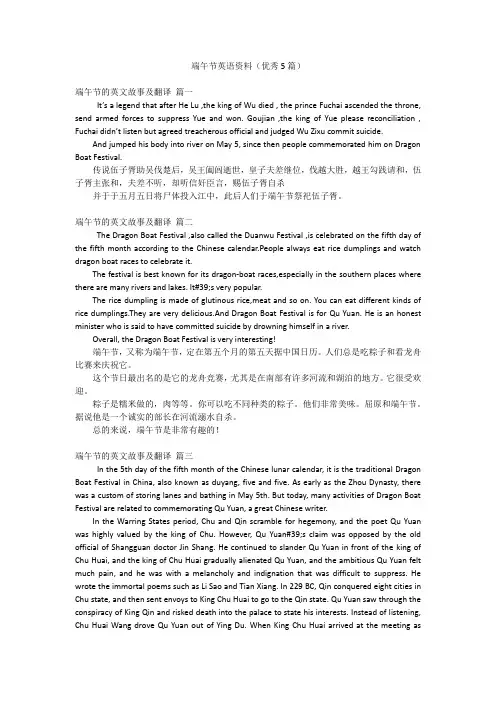
端午节英语资料(优秀5篇)端午节的英文故事及翻译篇一It’s a legend that after He Lu ,the king of Wu died , the prince Fuchai ascended the throne, send armed forces to suppress Yue and won. Goujian ,the king of Yue please reconciliation , Fuchai didn’t listen but agreed treacherous official and judged Wu Zixu commit suicide.And jumped his body into river on May 5, since then people commemorated him on Dragon Boat Festival.传说伍子胥助吴伐楚后,吴王阖闾逝世,皇子夫差继位,伐越大胜,越王勾践请和,伍子胥主张和,夫差不听,却听信奸臣言,赐伍子胥自杀并于于五月五日将尸体投入江中,此后人们于端午节祭祀伍子胥。
端午节的英文故事及翻译篇二The Dragon Boat Festival ,also called the Duanwu Festival ,is celebrated on the fifth day of the fifth month according to the Chinese calendar.People always eat rice dumplings and watch dragon boat races to celebrate it.The festival is best known for its dragon-boat races,especially in the southern places where there are many rivers and lakes. It#39;s very popular.The rice dumpling is made of glutinous rice,meat and so on. You can eat different kinds of rice dumplings.They are very delicious.And Dragon Boat Festival is for Qu Yuan. He is an honest minister who is said to have committed suicide by drowning himself in a river.Overall, the Dragon Boat Festival is very interesting!端午节,又称为端午节,定在第五个月的第五天据中国日历。
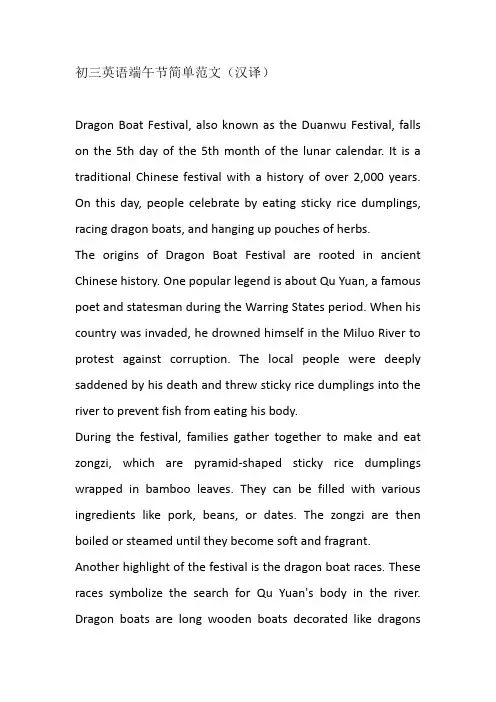
初三英语端午节简单范文(汉译)Dragon Boat Festival, also known as the Duanwu Festival, falls on the 5th day of the 5th month of the lunar calendar. It is a traditional Chinese festival with a history of over 2,000 years. On this day, people celebrate by eating sticky rice dumplings, racing dragon boats, and hanging up pouches of herbs.The origins of Dragon Boat Festival are rooted in ancient Chinese history. One popular legend is about Qu Yuan, a famous poet and statesman during the Warring States period. When his country was invaded, he drowned himself in the Miluo River to protest against corruption. The local people were deeply saddened by his death and threw sticky rice dumplings into the river to prevent fish from eating his body.During the festival, families gather together to make and eat zongzi, which are pyramid-shaped sticky rice dumplings wrapped in bamboo leaves. They can be filled with various ingredients like pork, beans, or dates. The zongzi are then boiled or steamed until they become soft and fragrant. Another highlight of the festival is the dragon boat races. These races symbolize the search for Qu Yuan's body in the river. Dragon boats are long wooden boats decorated like dragonswith a team of rowers and a drummer. People cheer and encourage the rowers as they paddle fiercely to the rhythm of the drums.In addition, it is common to see pouches of herbs hanging on doors during the Dragon Boat Festival. These pouches, known as "xiong bao" or "zong zi xiong," are believed to ward off evil spirits and bring good luck.Dragon Boat Festival is not only a time to enjoy delicious food and exciting races, but it is also an opportunity to remember and pay tribute to Qu Yuan and traditional Chinese culture. It is a festival filled with warmth, unity, and cultural heritage.端午节,也被称为龙舟节,是农历五月初五的传统中国节日。
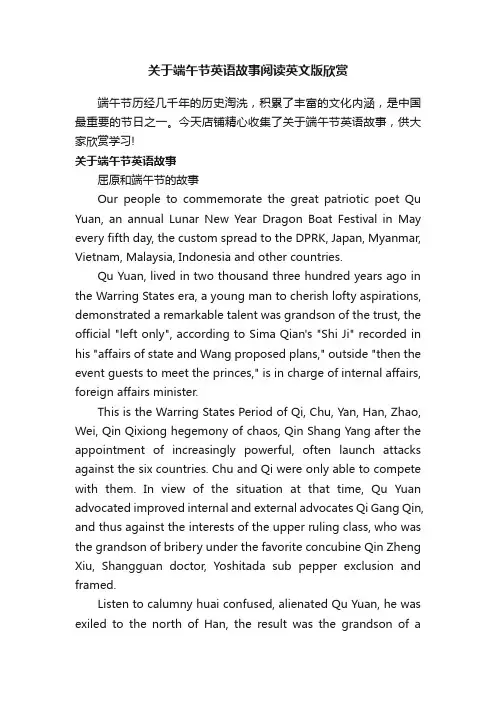
关于端午节英语故事阅读英文版欣赏端午节历经几千年的历史淘洗,积累了丰富的文化内涵,是中国最重要的节日之一。
今天店铺精心收集了关于端午节英语故事,供大家欣赏学习!关于端午节英语故事屈原和端午节的故事Our people to commemorate the great patriotic poet Qu Yuan, an annual Lunar New Year Dragon Boat Festival in May every fifth day, the custom spread to the DPRK, Japan, Myanmar, Vietnam, Malaysia, Indonesia and other countries.Qu Yuan, lived in two thousand three hundred years ago in the Warring States era, a young man to cherish lofty aspirations, demonstrated a remarkable talent was grandson of the trust, the official "left only", according to Sima Qian's "Shi Ji" recorded in his "affairs of state and Wang proposed plans," outside "then the event guests to meet the princes," is in charge of internal affairs, foreign affairs minister.This is the Warring States Period of Qi, Chu, Yan, Han, Zhao, Wei, Qin Qixiong hegemony of chaos, Qin Shang Yang after the appointment of increasingly powerful, often launch attacks against the six countries. Chu and Qi were only able to compete with them. In view of the situation at that time, Qu Yuan advocated improved internal and external advocates Qi Gang Qin, and thus against the interests of the upper ruling class, who was the grandson of bribery under the favorite concubine Qin Zheng Xiu, Shangguan doctor, Yoshitada sub pepper exclusion and framed.Listen to calumny huai confused, alienated Qu Yuan, he was exiled to the north of Han, the result was the grandson of aprisoner for three years when Qin cheated, died in a foreign country.Qu Yuan, see all of this, extreme anger. He firmly opposed to the state of Qin humiliating surrender, which was the persecution of political opponents are more serious. The new reign of King Xiang is more stupid than his father, banished Qu Yuan to the Chinese and the North than the more remote areas.In the long life of exile, Qu Yuan did not. He insisted that his political views, and never follow the crowd. Picked up a pen writing a love for their motherland, to denounce "N group" harm the country for future generations to leave the immortal poems.Qu Yuan, a Chinese literary history of the greatest and most distinguished Romantic poet, called him after the work is "Songs of the South." Masterpiece is the "Lament", which is the longest of Qu Yuan a lyric poem, a total of three hundred seventy-three, two thousand seven hundred and seventy seven words of the poem describes the poet to practice their own political views are being attack and persecution, must express their inner pain, faithful to the people and the feelings of the motherland.Qu Yuan in the long journey of exile, the spirit and life suffered devastation and suffering is imagined. One day he is Singing River, encountered a fishing hermit, hermit to see him looking haggard haggard, advised him "Do not rigidly stick to", "easy-going number", and the bigwigs were in cahoots. Yuan said: "I would rather go to Xiang River flows buried in the belly of the fish; security can Haohao of white, and almost dust mask secular?" Year seven to eight tests, was the capital of Chu Chi broken, the spirit of the poet has been a great blow, seeing the difficulty of breaking the country, but can not use his power, he was so frightened that in extreme disappointment and pain, thepoet came to the east of the Yangtze River Miluo, bouldering and drowned. He died about sixty years old, it is the Lunar May tenth.Two thousand years of age, which in the course of history can not be considered just a moment, but despite the drain, dusk to dawn-to, the image of the poet Qu Yuan, but still remain in people's heart. Today, Dragon Boat Festival every day, people are still in the river in the dragon boat racing, the dumplings, multicolored silk tie to commemorate the great poet Qu Yuan, see the works of the poet and the spirit is eternal it!关于端午节注意事项英语版Announcements of Eating zongzi吃粽子注意事项Eating zongzi on the Dragon Boat Festival is a Chinese traditional custom. People will prepare rice dumplings on the early Dragon Boat Festival every year. What’s need to notice when you eating or storing rice dumplings on the Dragon Boat Festival?端午节吃粽子是中国人的传统习俗,每年端午节,人们都早早地开始准备粽子。
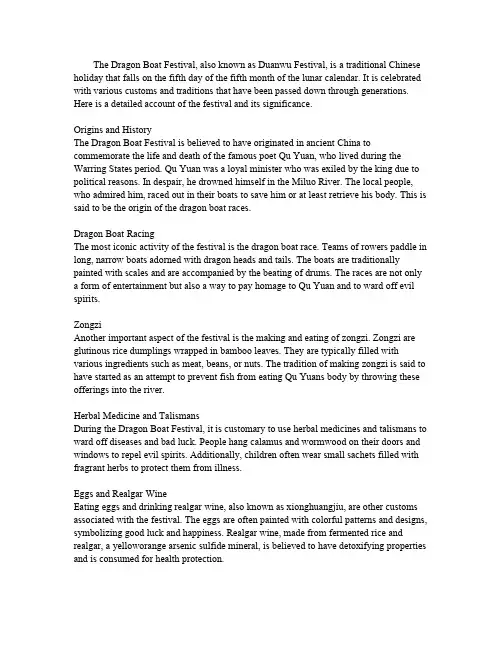
The Dragon Boat Festival,also known as Duanwu Festival,is a traditional Chinese holiday that falls on the fifth day of the fifth month of the lunar calendar.It is celebrated with various customs and traditions that have been passed down through generations. Here is a detailed account of the festival and its significance.Origins and HistoryThe Dragon Boat Festival is believed to have originated in ancient China to commemorate the life and death of the famous poet Qu Yuan,who lived during the Warring States period.Qu Yuan was a loyal minister who was exiled by the king due to political reasons.In despair,he drowned himself in the Miluo River.The local people, who admired him,raced out in their boats to save him or at least retrieve his body.This is said to be the origin of the dragon boat races.Dragon Boat RacingThe most iconic activity of the festival is the dragon boat race.Teams of rowers paddle in long,narrow boats adorned with dragon heads and tails.The boats are traditionally painted with scales and are accompanied by the beating of drums.The races are not only a form of entertainment but also a way to pay homage to Qu Yuan and to ward off evil spirits.ZongziAnother important aspect of the festival is the making and eating of zongzi.Zongzi are glutinous rice dumplings wrapped in bamboo leaves.They are typically filled with various ingredients such as meat,beans,or nuts.The tradition of making zongzi is said to have started as an attempt to prevent fish from eating Qu Yuans body by throwing these offerings into the river.Herbal Medicine and TalismansDuring the Dragon Boat Festival,it is customary to use herbal medicines and talismans to ward off diseases and bad luck.People hang calamus and wormwood on their doors and windows to repel evil spirits.Additionally,children often wear small sachets filled with fragrant herbs to protect them from illness.Eggs and Realgar WineEating eggs and drinking realgar wine,also known as xionghuangjiu,are other customs associated with the festival.The eggs are often painted with colorful patterns and designs, symbolizing good luck and happiness.Realgar wine,made from fermented rice and realgar,a yelloworange arsenic sulfide mineral,is believed to have detoxifying properties and is consumed for health protection.Cultural SignificanceThe Dragon Boat Festival is not only a time to remember Qu Yuan but also an opportunity to reflect on the values of loyalty,patriotism,and integrity.It is a time for families to come together,share meals,and engage in community activities that strengthen cultural bonds.In conclusion,the Dragon Boat Festival is a rich and vibrant celebration that encompasses a variety of customs and traditions.It is a testament to the enduring spirit of the Chinese people and their deep connection to their history and cultural heritage.。
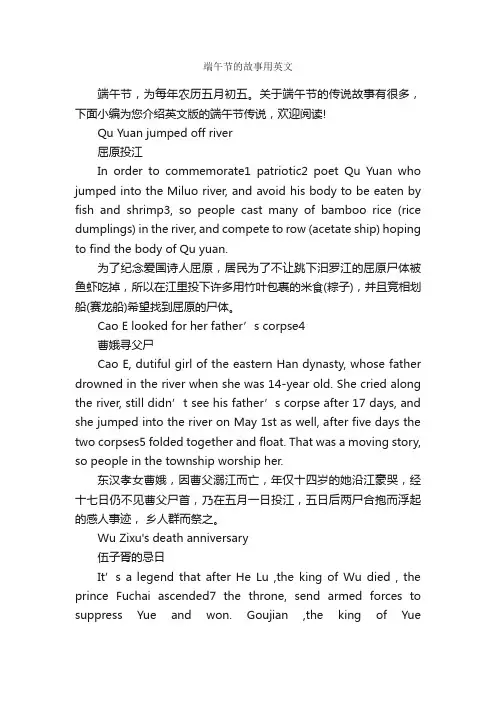
端午节的故事用英文端午节,为每年农历五月初五。
关于端午节的传说故事有很多,下面小编为您介绍英文版的端午节传说,欢迎阅读!Qu Yuan jumped off river屈原投江In order to commemorate1 patriotic2 poet Qu Yuan who jumped into the Miluo river, and avoid his body to be eaten by fish and shrimp3, so people cast many of bamboo rice (rice dumplings) in the river, and compete to row (acetate ship) hoping to find the body of Qu yuan.为了纪念爱国诗人屈原,居民为了不让跳下汨罗江的屈原尸体被鱼虾吃掉,所以在江里投下许多用竹叶包裹的米食(粽子),并且竞相划船(赛龙船)希望找到屈原的尸体。
C ao E looked for her father’s corpse4曹娥寻父尸Cao E, dutiful girl of the eastern Han dynasty, whose father drowned in the river when she was 14-year old. She cried along the river, still didn’t see his father’s corpse after 17 days, and she jumped into the river on May 1st as well, after five days the two corpses5 folded together and float. That was a moving story, so people in the township worship her.东汉孝女曹娥,因曹父溺江而亡,年仅十四岁的她沿江豪哭,经十七日仍不见曹父尸首,乃在五月一日投江,五日后两尸合抱而浮起的感人事迹,乡人群而祭之。
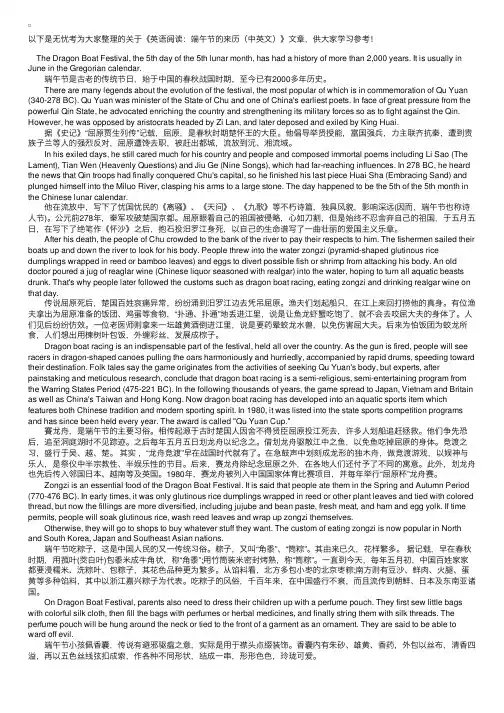
以下是⽆忧考为⼤家整理的关于《英语阅读:端午节的来历(中英⽂)》⽂章,供⼤家学习参考! The Dragon Boat Festival, the 5th day of the 5th lunar month, has had a history of more than 2,000 years. It is usually in June in the Gregorian calendar. 端午节是古⽼的传统节⽇,始于中国的春秋战国时期,⾄今已有2000多年历史。
There are many legends about the evolution of the festival, the most popular of which is in commemoration of Qu Yuan (340-278 BC). Qu Yuan was minister of the State of Chu and one of China's earliest poets. In face of great pressure from the powerful Qin State, he advocated enriching the country and strengthening its military forces so as to fight against the Qin. However, he was opposed by aristocrats headed by Zi Lan, and later deposed and exiled by King Huai. 据《史记》“屈原贾⽣列传”记载,屈原,是春秋时期楚怀王的⼤⾂。
他倡导举贤授能,富国强兵,⼒主联齐抗秦,遭到贵族⼦兰等⼈的强烈反对,屈原遭馋去职,被赶出都城,流放到沅、湘流域。
In his exiled days, he still cared much for his country and people and composed immortal poems including Li Sao (The Lament), Tian Wen (Heavenly Questions) and Jiu Ge (Nine Songs), which had far-reaching influences. In 278 BC, he heard the news that Qin troops had finally conquered Chu's capital, so he finished his last piece Huai Sha (Embracing Sand) and plunged himself into the Miluo River, clasping his arms to a large stone. The day happened to be the 5th of the 5th month in the Chinese lunar calendar. 他在流放中,写下了忧国忧民的《离骚》、《天问》、《九歌》等不朽诗篇,独具风貌,影响深远(因⽽,端午节也称诗⼈节)。
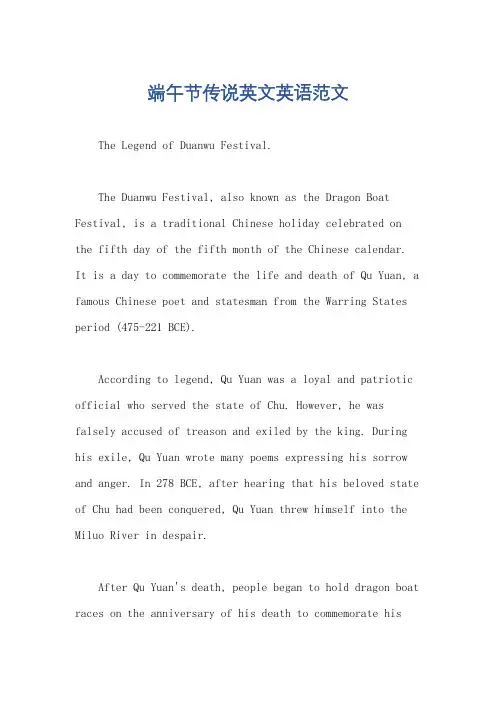
端午节传说英文英语范文The Legend of Duanwu Festival.The Duanwu Festival, also known as the Dragon Boat Festival, is a traditional Chinese holiday celebrated on the fifth day of the fifth month of the Chinese calendar.It is a day to commemorate the life and death of Qu Yuan, a famous Chinese poet and statesman from the Warring States period (475-221 BCE).According to legend, Qu Yuan was a loyal and patriotic official who served the state of Chu. However, he was falsely accused of treason and exiled by the king. During his exile, Qu Yuan wrote many poems expressing his sorrow and anger. In 278 BCE, after hearing that his beloved state of Chu had been conquered, Qu Yuan threw himself into the Miluo River in despair.After Qu Yuan's death, people began to hold dragon boat races on the anniversary of his death to commemorate hislife and sacrifice. Dragon boats are long, narrow boats that are decorated with dragon heads and tails. Teams of paddlers race each other in these boats, while spectators cheer them on from the shore.Over time, the Duanwu Festival has come to be associated with a number of other traditions, including eating zongzi (glutinous rice dumplings wrapped in bamboo leaves), drinking realgar wine, and hanging wormwood and calamus on doors and windows. These traditions are all believed to protect against evil spirits and bring good luck.The Duanwu Festival is a time for families to come together and celebrate Chinese culture. It is also a time to remember the life and legacy of Qu Yuan, a great poet and patriot.Symbolism of the Dragon Boat Festival.The Dragon Boat Festival is rich in symbolism, with many of its traditions and customs holding deep culturalsignificance.Dragon boats: Dragons are mythical creatures that are revered in Chinese culture. They are often associated with strength, power, and good fortune. The dragon boat races represent the people's struggle against adversity and their determination to overcome challenges.Zongzi: Zongzi are glutinous rice dumplings that are wrapped in bamboo leaves. They are a traditional food eaten during the Duanwu Festival. The bamboo leaves represent the purity and strength of the people, while the glutinous rice symbolizes the unity and cooperation of the community.Realgar wine: Realgar wine is a type of Chinese rice wine that is made with the mineral realgar. Realgar is a poisonous substance, but it is believed to have medicinal properties. The realgar wine is drunk during the Duanwu Festival to ward off evil spirits and prevent diseases.Wormwood and calamus: Wormwood and calamus are two types of herbs that are hung on doors and windows duringthe Duanwu Festival. They are believed to have the power to 驅邪(qūxié) evil spirits and protect the home.Cultural Significance of the Dragon Boat Festival.The Duanwu Festival is a deeply rooted tradition in Chinese culture. It is a time for families to come together and celebrate their heritage. The festival also provides an opportunity to reflect on the life and legacy of Qu Yuan, a great poet and patriot.The Dragon Boat Festival is a reminder of the importance of tradition, culture, and community in Chinese society. It is a time to celebrate the strength and resilience of the Chinese people.。
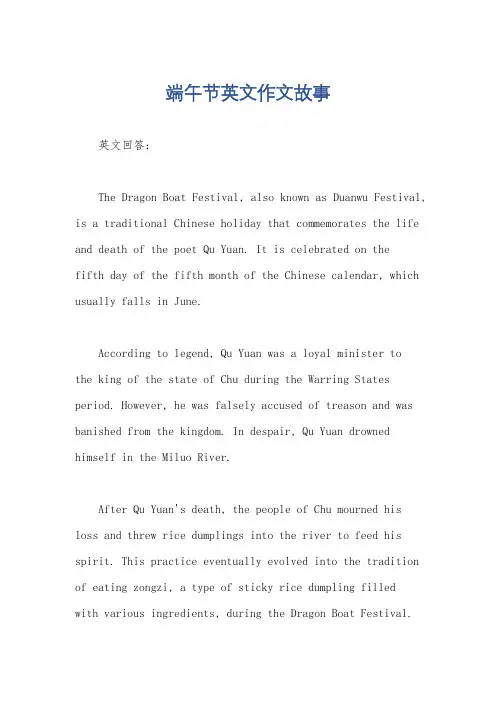
端午节英文作文故事英文回答:The Dragon Boat Festival, also known as Duanwu Festival, is a traditional Chinese holiday that commemorates the life and death of the poet Qu Yuan. It is celebrated on thefifth day of the fifth month of the Chinese calendar, which usually falls in June.According to legend, Qu Yuan was a loyal minister tothe king of the state of Chu during the Warring States period. However, he was falsely accused of treason and was banished from the kingdom. In despair, Qu Yuan drowned himself in the Miluo River.After Qu Yuan's death, the people of Chu mourned hisloss and threw rice dumplings into the river to feed his spirit. This practice eventually evolved into the tradition of eating zongzi, a type of sticky rice dumpling filledwith various ingredients, during the Dragon Boat Festival.Another tradition associated with the Dragon Boat Festival is dragon boat racing. Dragon boats are long, narrow boats with elaborate dragon heads and tails. During the festival, teams of paddlers race these boats in competitions held on rivers and lakes throughout China.The Dragon Boat Festival is also a time for families to gather together and enjoy traditional foods, such as zongzi, duck eggs, and calamus wine. It is also a time for peopleto pray for good luck and prosperity.中文回答:端午节,又称“五月节”,是中国传统节日,以纪念屈原投江而死。
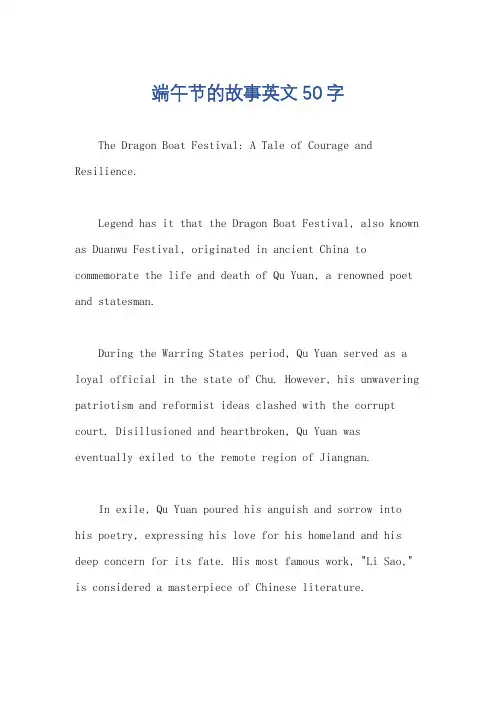
端午节的故事英文50字The Dragon Boat Festival: A Tale of Courage and Resilience.Legend has it that the Dragon Boat Festival, also known as Duanwu Festival, originated in ancient China to commemorate the life and death of Qu Yuan, a renowned poet and statesman.During the Warring States period, Qu Yuan served as a loyal official in the state of Chu. However, his unwavering patriotism and reformist ideas clashed with the corrupt court. Disillusioned and heartbroken, Qu Yuan was eventually exiled to the remote region of Jiangnan.In exile, Qu Yuan poured his anguish and sorrow into his poetry, expressing his love for his homeland and his deep concern for its fate. His most famous work, "Li Sao," is considered a masterpiece of Chinese literature.As the state of Chu faced impending invasion by therival state of Qin, Qu Yuan's pleas for unity and reform went unheeded. Despairing over his country's impending doom, Qu Yuan performed a symbolic act of protest.On the fifth day of the fifth lunar month, 278 BC, Qu Yuan approached the Miluo River and, with tears streaming down his face, composed a final poem on his sleeve. He then tied a large stone to his waist and plunged into the river, sacrificing his own life for the sake of his country.The people of Chu were devastated by Qu Yuan's death. They raced out in their fishing boats to search for his body, beating drums and splashing water to scare away the evil spirits that were believed to haunt the river.In memory of Qu Yuan and his unwavering patriotism, the Dragon Boat Festival was born. Each year, on the fifth dayof the fifth lunar month, people across China participatein dragon boat races, a thrilling and colorful traditionthat symbolizes the unity and resilience of the Chinese people.The dragon boat, an elongated and decorated vessel, is adorned with a dragon's head at the bow and a tail at the stern. The rowers, working in unison, paddle furiously to the sound of rhythmic drums, propelling the boat forward at incredible speeds.In addition to dragon boat races, the festival is also marked by the consumption of zongzi, sticky rice dumplings wrapped in bamboo leaves. These dumplings, traditionally filled with sweet or savory ingredients, represent theunity and prosperity of the Chinese people.The Dragon Boat Festival is a vibrant and meaningful celebration that transcends cultural and geographical boundaries. It is a testament to the enduring spirit of patriotism, resilience, and the power of tradition in Chinese culture.。
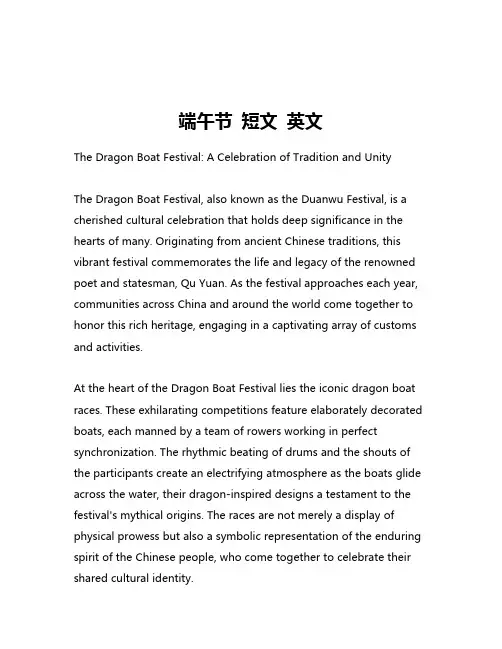
端午节短文英文The Dragon Boat Festival: A Celebration of Tradition and UnityThe Dragon Boat Festival, also known as the Duanwu Festival, is a cherished cultural celebration that holds deep significance in the hearts of many. Originating from ancient Chinese traditions, this vibrant festival commemorates the life and legacy of the renowned poet and statesman, Qu Yuan. As the festival approaches each year, communities across China and around the world come together to honor this rich heritage, engaging in a captivating array of customs and activities.At the heart of the Dragon Boat Festival lies the iconic dragon boat races. These exhilarating competitions feature elaborately decorated boats, each manned by a team of rowers working in perfect synchronization. The rhythmic beating of drums and the shouts of the participants create an electrifying atmosphere as the boats glide across the water, their dragon-inspired designs a testament to the festival's mythical origins. The races are not merely a display of physical prowess but also a symbolic representation of the enduring spirit of the Chinese people, who come together to celebrate their shared cultural identity.Alongside the thrilling boat races, the Dragon Boat Festival is also marked by the preparation and consumption of a delectable delicacy – the zongzi. These pyramid-shaped glutinous rice dumplings are meticulously wrapped in fragrant bamboo or reed leaves, often filled with a variety of savory or sweet fillings. The act of preparing and enjoying zongzi has become a cherished ritual, passed down through generations and infused with the essence of family, community, and tradition.The festival's traditions extend beyond the boat races and zongzi. Across China, people engage in a variety of other activities that celebrate the spirit of the occasion. Some communities organize dragon dances, where performers don elaborate costumes and bring the mythical creatures to life through intricate movements and acrobatics. Others partake in the custom of hanging calamus and mugwort, believed to have purifying and protective properties, around their homes and workplaces.The Dragon Boat Festival also holds deep symbolic significance. The legend of Qu Yuan, the revered poet who drowned himself in a river to protest political corruption, has inspired a profound sense of patriotism and civic responsibility among the Chinese people. The act of throwing rice dumplings into the water to feed the fish, in the hope of preventing them from devouring Qu Yuan's body, hasevolved into a gesture of mourning and remembrance.Beyond the cultural and historical significance, the Dragon Boat Festival also serves as a unifying force, bringing people together across generations and geographical boundaries. Families gather to share meals, exchange gifts, and engage in time-honored traditions, fostering a deep sense of community and belonging. The festival's vibrant celebrations transcend individual differences, reminding us of our shared heritage and the importance of preserving our cultural legacies.As the Dragon Boat Festival continues to be celebrated, its significance extends far beyond the boundaries of China. It has become a global celebration, with communities around the world embracing the festival's traditions and incorporating them into their own cultural tapestry. This cross-cultural exchange not only strengthens the understanding and appreciation of Chinese culture but also serves as a testament to the power of cultural diversity and the universal human desire to celebrate our shared traditions.In conclusion, the Dragon Boat Festival is a captivating and multifaceted celebration that encapsulates the rich heritage and enduring spirit of the Chinese people. From the exhilarating dragon boat races to the preparation of the beloved zongzi, the festival's customs and rituals serve as a powerful reminder of our sharedcultural identity and the importance of preserving our traditions for generations to come. As the world continues to embrace the Dragon Boat Festival, it stands as a shining example of how cultural celebrations can bring people together, fostering a deeper sense of unity and understanding.。
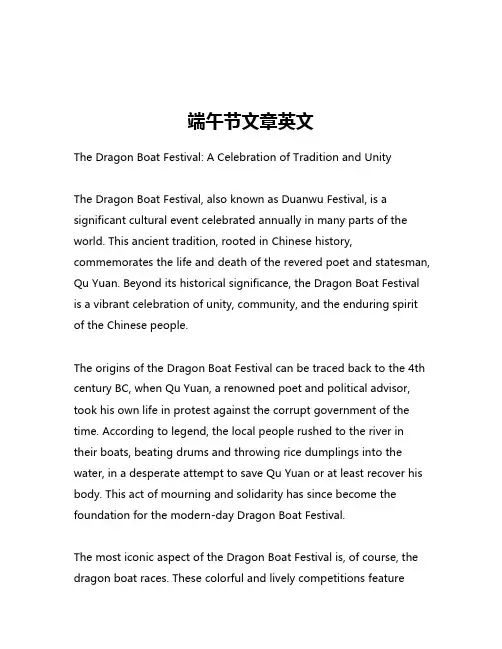
端午节文章英文The Dragon Boat Festival: A Celebration of Tradition and UnityThe Dragon Boat Festival, also known as Duanwu Festival, is a significant cultural event celebrated annually in many parts of the world. This ancient tradition, rooted in Chinese history, commemorates the life and death of the revered poet and statesman, Qu Yuan. Beyond its historical significance, the Dragon Boat Festival is a vibrant celebration of unity, community, and the enduring spirit of the Chinese people.The origins of the Dragon Boat Festival can be traced back to the 4th century BC, when Qu Yuan, a renowned poet and political advisor, took his own life in protest against the corrupt government of the time. According to legend, the local people rushed to the river in their boats, beating drums and throwing rice dumplings into the water, in a desperate attempt to save Qu Yuan or at least recover his body. This act of mourning and solidarity has since become the foundation for the modern-day Dragon Boat Festival.The most iconic aspect of the Dragon Boat Festival is, of course, the dragon boat races. These colorful and lively competitions featureelaborately decorated boats, each with a team of rowers working in perfect synchronization to propel their vessel across the water. The dragon boats themselves are meticulously crafted, often adorned with intricate carvings and painted in vibrant hues that reflect the rich cultural heritage of the festival. The beating of drums and the cheers of spectators create an electrifying atmosphere, as teams compete with unwavering determination to emerge victorious.Beyond the dragon boat races, the Dragon Boat Festival is celebrated through a variety of traditional customs and practices. One of the most enduring traditions is the consumption of zongzi, a savory or sweet rice dumpling wrapped in bamboo or lotus leaves. These delectable treats are believed to have originated as an offering to Qu Yuan, and they have since become an integral part of the festival's culinary heritage. Families and communities gather to prepare and share these special dumplings, fostering a sense of unity and shared cultural identity.Another significant aspect of the Dragon Boat Festival is the belief in its ability to ward off evil spirits and bring good fortune. During the festival, people often hang fragrant herbs and flowers, such as artemisia and calamus, around their homes and businesses, as these plants are believed to have purifying and protective properties. Additionally, the festival is associated with the use of traditional Chinese medicine, as certain herbs and remedies are thought to beparticularly potent during this time of year.The Dragon Boat Festival also serves as a platform for the preservation and celebration of traditional Chinese arts and crafts. Artisans and craftspeople showcase their skills in areas such as calligraphy, painting, and the creation of intricate paper-cutting designs. These artistic expressions not only add to the visual splendor of the festival but also serve as a means of passing down cultural traditions to younger generations.Beyond its cultural significance, the Dragon Boat Festival also holds important social and community-building functions. The festival provides an opportunity for families and friends to come together, share meals, and engage in various recreational activities. It is a time when communities rally around the common goal of honoring their shared heritage and fostering a sense of unity and belonging.In recent years, the Dragon Boat Festival has gained increasing global recognition, with the tradition being celebrated in many countries around the world. This cross-cultural exchange has not only raised awareness of Chinese culture but also inspired others to embrace the festival's core values of community, tradition, and the celebration of the human spirit.In conclusion, the Dragon Boat Festival is a remarkable celebrationthat transcends its historical origins to become a symbol of unity, cultural preservation, and the enduring spirit of the Chinese people. Through the vibrant dragon boat races, the shared culinary traditions, and the preservation of artistic expressions, the festival continues to captivate and inspire people from all walks of life, reminding us of the power of collective celebration and the enduring strength of cultural identity.。
端午英文作文故事简单英文:I have a story to share with you about the Dragon Boat Festival, also known as the Duanwu Festival. This festival is celebrated on the fifth day of the fifth lunar month, which usually falls in June.The festival is said to have originated from the legend of Qu Yuan, a famous poet and minister in ancient China. Qu Yuan was exiled from his state and, in despair, threw himself into the Miluo River. The local people, who admired him, raced their boats to try and save him, but were unsuccessful. To prevent the fish from eating his body, they threw rice dumplings, called zongzi, into the river.Today, the Dragon Boat Festival is celebrated by racing dragon boats and eating zongzi. The dragon boats are long, narrow boats decorated with dragon heads and tails. They are powered by a team of rowers who paddle to the beat of adrum. The races are exciting and competitive, with teams from different villages and cities competing against each other.Zongzi are sticky rice dumplings wrapped in bamboo leaves. They can be filled with a variety of ingredients, such as pork, mushrooms, and beans. They are then boiled or steamed until they are soft and fragrant. Zongzi are a traditional food eaten during the Dragon Boat Festival and are enjoyed by people of all ages.中文:我有一个故事要和你分享,关于端午节,也称为端午节。
Dragon Boat Festival Introduction1.The Dragon Boat Festival, also known as Duanwu Festival, is oneof the most important traditional Chinese festivals. It iscelebrated on the 5th day of the 5th month of the lunar calendar, which usually falls in June.2.Originating in ancient China, the Dragon Boat Festival has ahistory of over 2,000 years. It is believed to have originatedfrom the commemoration of Qu Yuan, a patriotic poet andstatesman of ancient China.3.Qu Yuan lived during the Warring States period and was deeplydevoted to his country. When his state was invaded and conquered by a rival state, he drowned himself in the Miluo River out ofdespair and sorrow.4.To prevent fish and evil spirits from devouring his body, localpeople paddled their boats on the river, beating drums andthrowing rice dumplings into the water. This tradition laterdeveloped into dragon boat races and eating zongzi, a specially prepared sticky rice dumpling wrapped in bamboo leaves.5.Dragon boat races are an essential part of the Dragon BoatFestival. Dragon boats are long and narrow boats, typicallydecorated with vibrant colors and dragon heads and tails. Teams of rowers paddle to the beat of a drum, racing against eachother to reach the finish line.6.The races attract thousands of spectators each year, who gatheralong the riverbanks to cheer for their favorite teams. Theexcitement and energy of the races make them a thrilling andmemorable experience.7.Besides dragon boat races, another significant aspect of thefestival is the consumption of zongzi. Zongzi is made bywrapping sticky rice around various fillings such as beans, meat, or nuts, and then steaming or boiling them. The result is adelicious and flavorful treat that has become synonymous withthe Dragon Boat Festival.8.The shape and ingredients of zongzi may vary depending onregional customs, but they are often pyramid-shaped and filledwith tasty surprises. Families come together to prepare andenjoy zongzi, strengthening the bond between loved ones.9.In addition to dragon boat races and zongzi, the Dragon BoatFestival also involves various other activities. These caninclude hanging up pouches of herbs to ward off evil spirits,wearing colorful silk threads to protect against evil, andmaking medicinal drinks called xiong huang jiu, believed tocleanse the body of toxins.10.The Dragon Boat Festival is not only celebrated in China butalso in other countries with Chinese communities. It has become an important cultural event that showcases China's richheritage and traditions to the world.11.In recent years, the Dragon Boat Festival has gained popularityoutside of China, with dragon boat races being held in manycities around the globe. These races bring people fromdifferent cultures together, fostering friendship andunderstanding.12.The Dragon Boat Festival is not only a time for celebration butalso a time for reflection on the values of loyalty, patriotism,and community spirit. It is a reminder of the importance ofpreserving and honoring one's history and cultural heritage. 13.As the Dragon Boat Festival continues to be celebrated andcherished, it serves as a testament to the enduring power oftradition and the ability to unite people in shared customs and celebrations.14.In conclusion, the Dragon Boat Festival is a vibrant andmeaningful festival that holds deep cultural significance inChinese society. Through dragon boat races, zongzi, and various customs and traditions, this festival brings joy and unity topeople both within and outside of China. It is a time to honor the past, create lasting memories, and embrace the values that have been passed down through generations.。
中国故事端午节英文版作文英文:Dragon Boat Festival, also known as Duanwu Festival, is a traditional Chinese festival that falls on the fifth day of the fifth lunar month. It is celebrated to commemorate the death of Qu Yuan, a patriotic poet and minister in ancient China.On this day, people eat zongzi, a sticky rice dumpling wrapped in bamboo leaves, and race dragon boats. The zongzi is usually filled with meat, beans, and other ingredients, and can be sweet or savory. The dragon boat race is a popular sport in China, with teams competing to be thefirst to reach the finish line.Apart from zongzi and dragon boat racing, there are other customs associated with the festival. For example, people hang mugwort and calamus leaves on their doors to ward off evil spirits, and children wear fragrant pouchesaround their necks to protect themselves from diseases.As a Chinese person, I have many fond memories of celebrating the Dragon Boat Festival with my family. We would wake up early to make zongzi together, and then spend the day watching the dragon boat races and enjoying each other's company.中文:端午节,也叫龙舟节,是中国传统节日之一,日期在农历五月初五。
端午节传说英文范文Title: The Legend of the Dragon Boat Festival.The Dragon Boat Festival, also known as the Duanwu Festival or the Double Fifth Festival, is a traditional Chinese holiday celebrated on the fifth day of the fifth month of the lunar calendar. This festival is deeply rooted in history and culture, and is marked by various customs and traditions, including dragon boat races, eating zongzi (rice dumplings), and hanging herbal lanterns. The origin of this festival is closely tied to a legendary story about a patriot named Qu Yuan.Qu Yuan was a minister in the court of the ancient state of Chu during the Warring States Period. He was a highly respected and talented official, known for his patriotism and dedication to the welfare of his country. However, due to political corruption and the influence of powerful rivals, he was eventually exiled from the court.During his exile, Qu Yuan wrote many poems expressinghis sorrow and concern for the fate of his country. He eventually committed suicide by drowning himself in a river, leaving behind a legacy of sadness and loss. The people of Chu were deeply saddened by his passing, and they decidedto commemorate his life and sacrifice by holding a festival on the day of his death.The Dragon Boat Festival is said to have originatedfrom this commemoration. On this day, people would row dragon boats on the river to search for Qu Yuan's body, hoping to find and rescue him. They would also throw rice into the river to feed the fish and prevent them fromeating Qu Yuan's body. Over time, these customs evolvedinto the dragon boat races and eating zongzi that are still practiced today.The festival also involves hanging herbal lanterns and wearing fragrant sachets. These customs are believed tohave originated from the ancient belief that herbs and fragrant plants can ward off evil spirits and bring good health and prosperity. During the festival, families wouldoften gather together to make zongzi and enjoy them as a symbol of unity and peace.The Dragon Boat Festival is not only a time for celebration and fun, but also a reminder of Qu Yuan's patriotism and sacrifice. It serves as a powerful reminder of the importance of patriotism, loyalty, and the value of life. The story of Qu Yuan and the Dragon Boat Festival has been passed down through generations, becoming an integral part of Chinese culture and history.Today, the Dragon Boat Festival is celebrated not only in China, but also in other parts of the world where Chinese culture has influenced. It is a time for family reunions, community gatherings, and the celebration of cultural heritage. The dragon boat races are a thrilling spectacle, drawing crowds of spectators to watch the boats race across the river. The festive atmosphere is filled with joy, excitement, and a sense of pride in one'scultural identity.In conclusion, the Dragon Boat Festival is a rich andmeaningful celebration that honors the legacy of Qu Yuan and his dedication to his country. It is a time for remembering and honoring our own heroes and patriots, as well as celebrating the beauty and diversity of Chinese culture. As we continue to celebrate this festival, let us also remember the values and lessons it teaches us about patriotism, loyalty, and the importance of preserving our cultural heritage.。
有关端午节的英语小短文It's that time of year again, the Dragon Boat Festival! The air is filled with the aroma of sticky rice and sweet bean paste. Families gather together to make and enjoy zongzi, those tasty rice dumplings wrapped in bamboo leaves. The festival is all about tradition, from the vibrantdragon boat races to the hanging of herbs and wreaths on doorways to ward off evil spirits.Oh, and did you know? The Dragon Boat Festival also has a deep cultural meaning. It's said to commemorate the ancient poet Qu Yuan, who threw himself into the river because he was heartbroken over the corruption in his country. People rowed out in boats to search for him, throwing rice dumplings into the water to feed the fish and prevent them from eating his body. That's why we eat zongzi today!One of the most exciting parts of the festival is the dragon boat races. Teams paddle furiously in their brightlydecorated boats, trying to outrace each other. The crowds cheer loudly, adding to the festive atmosphere. It's agreat way to spend a sunny day, watching the boats glide across the water.And let's not forget the food! Zongzi come in all shapes and sizes, with different fillings like red bean, meat, and even eggs. They're wrapped in bamboo leaves and tied up tightly, then steamed until they're soft and sticky. Eating zongzi is a must during the Dragon Boat Festival. Plus.。
端午节小故事英语演讲稿(通用20篇)端午节小故事英语篇1Today is the Dragon Boat Festival, but I dont know the origin of the Dragon Boat Festival. Mother told me that, during the warring states period, chu qu yuan, a minister, SIMS speak ill of qu yuan to the emperor, the emperor no longer trust of qu yuan and his exiled to the distance, he jumped river being the very sad. In order to commemorate him, the common people threw food into the river and formed the Dragon Boat Festival.Dragon Boat Festival we eat zongzi, tie the colorful rope, dragon boat, what a busy and remarkable!Do you like Dragon Boat Festival? Dont forget to study qu yuans patriotism when eating zongzi!端午节小故事英语演讲稿篇2I’m LiHua, president of the Student Union. I’m writing to invite you to our Dragon Boat Festival celebration, which is to be held in the Lecture Hall at 14:00 next Monday.The Duanwu or Dragon Boat Festival, generally celebrated on the fifth month of the Chinese lunar calender, falls on June 18 this year. It is one of the oldest festivals in China, with a history of more than 2,000 years. Legend holds that this festival is in memory of Qu Yuan, a patriotic poet during the Warring States Period.In the celebration, you can enjoy a performance about that legend and watch live broadcast of dragon boat racing. In the meanwhile, varieties of Zongzi, an essential food for this unique occasion, are available, which take different shapes and various fillings. Come and join us!Your early reply is highlyappreciated!端午节小故事英语演讲稿篇3The Dragon Boat Festival is a traditional festival of the han. It is a very important festival in our hometown, so every year the Dragon Boat Festival is very busy.The Dragon Boat Festival is the most indispensable, nature is zongzi, every year the grandmother of the Dragon Boat Festival and everyone will pack hundreds of big dumplings! There are many kinds of dumplings, such as reed leaves, bamboo shoots, wild leaves and lotus leaves. But our hometown is a lot of reeds, so most of them are wrapped in reeds. First, grandma "rate the army" to pick reed leaves. When picking reed leaves, a large family listens to grandmothers labor trumpet: "come on! A zongzi three leaf! Hundreds of zongzi thousands of pieces, hey, come on!" Listen to the drum of the "general", "little soldier" more effort! After the reed leaves, just burn them. But the preparation material is not so simple, still have to go to the bazaar to buy the good red bean, the pork, the peanut, the plate millet, the jujube and the glutinous rice, also buy the red line!Of course, the most fun time is when you make zongzi. When making zongzi, the man is responsible for cutting the meat into small pieces. Women are responsible for the washing of red beans and glutinous rice. The child was responsible for washing the basin clean, and then putting the mans work in a large basin. The older people are in charge. When everything is ready, the dumplings are started. The adults are working harder, and the kids? Is playing in a side, always when the adults do not pay attention to, to steal a couple of dates, mouth on the surface seems to be a little things didnt do, but in my heart secretly complacent - because jujube is delicious!The final step is boiled dumplings, grandpa always keep thetemperature of fire to grasp well, smell very sweet, very strong, if eating zongzi in the first, you can see the meat dumplings are always tender oil and see jujube rice dumplings are always the golden tender; The eight-treasure zongzi is always delicious, and we are cute.Last year, my grandparents might have made zongzi, if they hadnt taken care of my uncle and aunt in yancheng. I was suddenly "disgusted" with my uncle, aunt, who had a good economic condition, why not find a babysitter? Take my joyful Dragon Boat Festival and zongzi all "take away", I be so angry! Or miss the delicious dumplings!端午节小故事英语演讲稿篇4Dragon Boat Festival is a traditional festival, legend in the miluo river, a patriotic poet qu yuans body, the people in honor of he threw zongzi in miluo river, shrimp and the harm to the body of qu yuan. Then gradually evolved into todays Dragon Boat Festival. Also not only the Dragon Boat Festival to eat dumplings, dragon boat racing, this project is to use the power of the dragon king, dont let the bold fish and shrimp eat to qu yuans dumplings. Stand in leading the people in charge of big drum, in the person responsible for boating, delimit the fastest that a fleet, can get the first name and prizes, back to shore, and sat in a chair, eating of waxy waxy, sweet sweet, sweet dumplings, watching the scenery, breathing the fresh air, dont mention how comfortable. In the evening, and with a background that infinite good sunset, men, women and children dressed in costumes, singing and dancing joyfully. Is a "sunset infinite good, just near evening". In a short time, it is dark. People sat together, singing, said amicably, eat his food, feeling really great! Time slipped, can you side, not to leave, had to silent night not black,wanjiadenghuo reflected into the day.端午节小故事英语演讲稿篇5Duanwu Festival is a traditional Chinese festival held on the fifth day of the fifth month of the Chinese calendar. It is also known as the Double Fifth.It has since been celebrated, in various ways, in other parts of East Asia as well. In the West, its commonly known as Dragon Boat Festival.The exact origins of Duan Wu are unclear, but one traditional view holds that the festival memorializes the Chinese poet Qu Yuan of the Warring States Period. He committed suicide by drowning himself in a river because he was disgusted by the corruption of the Chu government. The local people, knowing him to be a good man, decided to throw food into the river to feed the fish so they would not eat Qus body. They also sat on long, narrow paddle boats called dragon boats, and tried to scare the fish away by the thundering sound of drums aboard the boat and the fierce looking carved dragon head on the boats prow(船头).In the early years of the Chinese Republic, Duan Wu was also celebrated as "Poets Day," due to Qu Yuans status as Chinas first poet of personal renown(名声名望).Today, people eat bamboo-wrapped steamed glutinous(粘的) rice dumplings called the food originally intended to feed the fish and race dragon boats in memory of Qus dramatic death.端午节小故事英语演讲稿篇6Thanks a lot for your last letter, in which you asked me about the Dragon Boat Festival, a traditional Chinese festival. Here is something about it.Over a thousand years ago, there was a famous poem called Qu Yuan in China. He cared about the common people as well asthe whole country, so he did a lot for them. However, he was not satisfied with the political situation at that time. What’s worse, he was unable to change it. At last, he felt so hopeless that he decided to take his own life. Finally, he jumped into the Miluo River and drowned. In memory of him, people created the Dragon Boat Festival.The Dragon Boat Festival falls on the fifth day of the fifth lunar month, so it is also called the Double Fifth Festival. It usually comes in June. In China, it has been a public holiday, so we have 3 days off. On that day, we usually eat zongzi, a kind of traditional Chinese food, which is made of glutinous rice (stuffed with different things). It tastes really delicious. We also drink xionghua wine. It’s said that it can keep us from evil spirits. To celebrate this festival, what’s more, we have many activities. The most popular one is dragon boat races. People usually take active part in them and enjoy themselves a lot during the races.I’m really glad that you’re interested in our Dragon Boat Festival. If you want to know more about it, I’d like to send you some photos that I took during the festival last year. I hope they will be helpful.I’m looking forward to hearing from you.端午节小故事英语演讲稿篇7The theme of the speech under the flag today is to commemorate qu yuan, theDragon Boat Festival.Everyone knows that the fifth day of the fifth lunar month is thetraditional festival of the Chinese nation -- the Dragon Boat Festival. So howdoes the Dragon Boat Festival come from? The Dragon Boat Festival is also calledthe terminal five, the meaning of the "end" is the same as the "beginning" andthe "end five" is also called "the first five". The "five" words of the terminalfive areconnected with the "noon", which is the "noon" month. It is also called"duanyang" because of the noon hour. On May 5, the month and the day were five,so weighed five, also called the great noon. In addition, there are many othernames in the Dragon Boat Festival, such as: summer festival, bath orchidfestival, girl's day, the festival of heaven, the earth, the poet's day, and soon.The name of the Dragon Boat Festival is more than that. And that's exactlywhat happened. There are at least four or five theories about the origin of theDragon Boat Festival. The wu yue national totem festival; Starting from threegenerations of summer solstice; The evil month of evil days, and so on. So far,the idea of the most influential Dragon Boat Festival origin is to commemoratequ yuan. In the field of folk culture, the dragon boat race and dragon boat raceare the main customs of the Dragon Boat Festival. Legend has it that the ancientpeople of the state of chu were forced to die in the river, and many peoplerowed to the rescue. They rushed to the lake and disappeared. The dragon boat isthen on May 5 each year. Use the dragon boat to disperse the fish in the river,so as not to eat the body of qu yuan. The practice of the race is popular in wu,yue and chu.The Dragon Boat Festival eats zongzi, which is another traditional customof the Chinese people. Zongzi, also called "corn", "zongzi". It has a longhistory. Every year in early may, the Chinese people will soak glutinous rice,wash zongzi and make zongzi, and they will have more variety. From the filling,the Beijing date zongzi, which is covered in the north, is covered with the south, there is a variety of fillings such as bean paste, fresh meat, hamand egg yolk, which is represented by jiaxing zongziin zhejiang province. Thecustom of eating zongzi, which has been popular in China for thousands of years,has been popular in north Korea, Japan and southeast Asia.China has a long history of traditional culture.In order to pass on the patriotic tradition of qu yuan, we must study hardand make progress every day. Thank you very much. 端午节小故事英语演讲稿篇8The Dragon Boat Festival in my hometown is there are a lot of cultured.Zongzi, leaves a request, the fresh bamboo leaves; Green green; Sending out thelight faint scent. If use dry out after the dumplings boiled bamboo leaves nobamboo fragrance. One afternoon before the Dragon Boat Festival all rawmaterials ready, white glutinous rice soaked in water, full of red bean, peanut,have already ready, or chopped pork belly, have already with good ingredientsflooded system. With deft hands industrious goodwife is left folded right, thenuse the rope layer upon layer, a delicate rice dumplings was born soon. Cookedpot and the house was filled with the fragrance of bamboo and rice dumplings. Inaddition to eating zongzi and eggs is little not. This two kinds of food are puttogether, even if you dont eat just looking at is to enjoy, the red oval eggs,meat green irregular shape of the dumplings, from color collocation to thecombination of shape, it. Smoked, hang mugwort on the lintel on the Dragon BoatFestival day. Hang sachets, various shapes of decorations, cloth make it brightput spices on the inside. Every year my mother to help me buy a hanging in hischest.端午节小故事英语演讲稿篇9dragon boat festival, often known as tuen ng festival or duan wu festival,is a traditional chinese festival held on the fifth day of the fifth month ofthe chinese calendar. it is also known as thedouble fifth.[citation needed] ithas since been celebrated, in various ways, in other parts of east asia as well,most notably korea.the exact origins of duan wu are unclear, but one traditional view holdsthat the festival memorializes the chinese poet qu yuan of the warring statesperiod. he committed suicide by drowning himself in a river because he wasdisgusted by the corruption of the chu government. the local people, knowing himto be a good man, decided to throw food into the river to feed the fishes toprevent them from eating qu's body. they also sat on dragon boats, and tried toscare the fishes away by the thundering sound of drums aboard the boat and thefierce looking dragon-head in the front of the boat.in the early years of the chinese republic, duan wu was also celebrated as"poets' day", due to qu yuan's status as china's first poet of personalrenown.today, people eat zongzi (the food originally intended to feed the fishes)and race dragon boats in memory of qu's dramatic death.端午节小故事英语演讲稿篇10qu yuanthe dragon boat festival, also called the duanwu festival, iscelebrated on the fifth day of the fifth month according to the chinese calendar. for thousands of years, the festival has been marked by eating zong zi (glutinous rice wrapped to form a pyramid using bamboo or reed leaves) and racing dragon boats.the festival is best known for its dragon-boat races, especially in the southern provinces where there are many rivers and lakes. this regatta commemorates the death of qu yuan , an honest minister who is said to have committed suicide bydrowning himself in a river.qu was a minister of the state of chu situated in present-day hunan and hubei provinces, during the warring states period (475-221bc). he was upright, loyal and highly esteemed for his wise counsel that brought peace and prosperity to the state. however, when a dishonest and corrupt prince vilified qu, he was disgraced and dismissed from office. realizing that the country was now in the hands of evil and corrupt officials, qu grabbed a large stone and leapt into the miluo river on the fifth day of the fifth month. nearby fishermen rushed over to try and save him but were unable to even recover his body. thereafter, the state declined and was eventually conquered by the state of qin.during the duanwu festival, a glutinous rice pudding called zong zi is eaten to symbolize the rice offerings to qu. ingredients such as beans, lotus seeds, chestnuts, pork fat and the golden yolk of a salted duck egg are often added to the glutinous rice. the pudding is then wrapped with bamboo leaves, bound with a kind of raffia and boiled in salt water for hours.the dragon-boat racesthe dragon-boat races symbolize the many attempts to rescue and recover qus body. a typical dragon boat ranges from 50-100 feet in length, with a beam of about 5.5 feet, accommodating two paddlers seated side by side.a wooden dragon head is attached at the bow, and a dragon tail at the stern.a banner hoisted on a pole is also fastened at the stern and the hull is decorated with red, green and blue scales edged in gold. in the center of the boat is a canopied shrine behind which the drummers, gong beaters and cymbal players are seated to set the pace for the paddlers. there are also men positioned at the bow to set off firecrackers, toss rice into the water andpretend to be looking for qu. all of the noise and pageantry creates an atmosphere of gaiety and excitement for the participants and spectators alike. the races are held among different clans, villages and organizations, and the winners are awarded medals, banners, jugs of wine and festive meals.端午节小故事英语演讲稿篇11The Dragon Boat Festival in my hometown is there are a lot of cultured.Zongzi, leaves a request, the fresh bamboo leaves; Green green; Sending out thelight faint scent. If use dry out after the dumplings boiled bamboo leaves nobamboo fragrance. One afternoon before the Dragon Boat Festival all rawmaterials ready, white glutinous rice soaked in water, full of red bean, peanut,have already ready, or chopped pork belly, have already with good ingredientsflooded system. With deft hands industrious goodwife is left folded right, thenuse the rope layer upon layer, a delicate rice dumplings was born soon. Cookedpot and the house was filled with the fragrance of bamboo and rice dumplings. Inaddition to eating zongzi and eggs is little not. This two kinds of food are puttogether, even if you don't eat just looking at is to enjoy, the red oval eggs,meat green irregular shape of the dumplings, from color collocation to thecombination of shape, it. Smoked, hang mugwort on the lintel on the Dragon BoatFestival day. Hang sachets, various shapes of decorations, cloth make it brightput spices on the inside. Every year my mother to help me buy a hanging in hischest.我家乡的端午节是有很多讲究的。
关于端午节英语故事阅读英文版欣赏关于端午节英语故事阅读英文版欣赏导读:我根据大家的需要整理了一份关于《关于端午节英语故事阅读英文版欣赏》的内容具体内容:端午节历经几千年的历史淘洗积累了丰富的文化内涵是中国最重要的节日之一。
今天我精心收集了关于端午节英语故事供大家欣赏学习!关于端午节英语故事屈原和端午节的故事...端午节历经几千年的历史淘洗积累了丰富的文化内涵是中国最重要的节日之一。
今天我精心收集了关于端午节英语故事供大家欣赏学习!关于端午节英语故事屈原和端午节的故事Our people to memorate the great patriotic poet Qu Yuan, an annual Lunar New Year Dragon Boat Festival inMay every fifth day, the custom spread to the DPRK, Japan, Myanmar, Vietnam, Malaysia, Indonesia and other countries.Qu Yuan, lived in two thousand three hundred yearsago in the Warring States era, a young man to cherishlofty aspirations, demonstrated a remarkable talent was grandson of the trust, the official “left only”, according to Sima Qians “Shi Ji” recorded in his“affairs of state and Wang proposed plans,” outside “then the event guests to meet the princes,” is in charge of internal affairs, foreign affairs minister.This is the Warring States Period of Qi, Chu, Yan, Han, Zhao, Wei,Qin Qi_iong hegemony of chaos, Qin Shang Yang after the appointment of increasingly powerful, often launch attacks against the si_ countries. Chu and Qi were only able to pete with them. In view of the situation at that time, Qu Yuan advocated improved internal and e_ternal advocates Qi Gang Qin, and thus against the interests of the upper ruling class, who was the grandson of bribery under the favorite concubine Qin Zheng _iu, Shangguan doctor, Yoshitada sub pepper e_clusion and framed.Listen to calumny huai confused, alienated Qu Yuan, he was e_iled to the north of Han, the result was the grandson of a prisoner for three years when Qin cheated, died in a foreign country.Qu Yuan, see all of this, e_treme anger. He firmly opposed to the state of Qin humiliating surrender, which was the persecution of political opponents are more serious. The new reign of King _iang is more stupid thanhis father, banished Qu Yuan to the Chinese and the North than the more remote areas.In the long life of e_ile, Qu Yuan did not. He insisted that his political views, and never follow the crowd. Picked up a pen writing a love for their motherland, to denounce “N group” harm the country for future generations to leave the immortal poems.Qu Yuan, a Chinese literary history of the greatest and most distinguished Romantic poet, called him after the w ork is “Songsof the South.” Masterpiece is the “Lament”, which is the longest of Qu Yuan a lyric poem, a total of three hundred seventy-three, two thousand seven hundred and seventy seven words of the poem describes the poet to practice their own political views are being attack and persecution, must e_press their inner pain, faithful to the people and the feelings of the motherland.Qu Yuan in the long journey of e_ile, the spirit and life suffered devastation and suffering is imagined. One day he is Singing River, encountered a fishing hermit, hermit to see him looking haggard haggard, advised him “Do not rigidly stick to”, “easy-going number”, andthe bigwigs were in cahoots. Yuan said: “I would rather go to _iang River flows buried in the belly of the fish; security can Haohao of white, and almost dust mask secular?” Year seven to eight tests, was the capital of Chu Chi broken, the spirit of the poet has been a great blow, seeing the difficulty of breaking the country, but can not use his power, he was so frightened that ine_treme disappointment and pain, the poet came to theeast of the Yangtze River Miluo, bouldering and drowned. He died about si_ty years old, it is the Lunar May tenth.Two thousand years of age, which in the course of history can not be considered just a moment, but despite the drain, dusk to dawn-to, the image of the poet Qu Yuan, but still remain in peoples heart.Today, Dragon Boat Festival every day, people arestill in the river in the dragon boat racing, the dumplings, multicolored silk tie to memorate the greatpoet Qu Yuan, see the works of the poet and the spirit is eternal it!关于端午节注意事项英语版Announcements of Eating zongzi吃粽子注意事项Eating zongzi on the Dragon Boat Festival is a Chinese traditional custom. People will prepare rice dumplings on the early Dragon Boat Festival every year. Whats need to notice when you eating or storing rice dumplings on the Dragon Boat Festival?端午节吃粽子是中国人的传统习俗每年端午节人们都早早地开始准备粽子。
粽子在保存和食用上有什么需要注意的呢?1.Must put in refrigerator一定放冰箱保存The main ingredient of glutinous rice dumplings are red jujube and bean paste or meat, so in the early summer hot weather is easy to spoil. Jujube and bean paste in refrigerator can store 3-5 days, if it is meat, atewithin 3 days as well.粽子的主要成分是糯米加上红枣、豆沙或者肉因此在初夏炎热的天气里很容易变质。